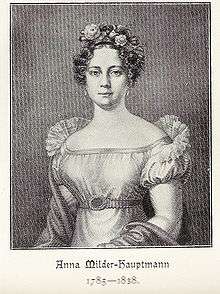The Shepherd on the Rock
_Facsimile_W._Dahms%2C_1913.jpg)

"The Shepherd on the Rock" (German: Der Hirt auf dem Felsen), D. 965, is a Lied for soprano, clarinet, and piano by Franz Schubert. It was composed in 1828 during the final months of his life.
Lyrics
Of the seven verses, the first four and the last came from the poetry of Wilhelm Müller, while verses five and six were written by Karl August Varnhagen von Ense.[1]
Background
The Lied was written as a belated response to a request from the operatic soprano Pauline Anna Milder-Hauptmann, a friend of Schubert. She had requested a showpiece that would allow her to express a wide range of feelings. It was published a year and a half after Schubert's death. Milder sang it for the first time at the House of the Blackheads in Riga on 10 February 1830.[2]
Structure
The Lied is multi-sectional with the clarinet and the voice equally challenged. The first section is warm as the lonely shepherd, high on the mountain top, listens to the echoes rising from below. The second section becomes quite dark as the shepherd expresses his all encompassing grief and loneliness. The third and last section is a sign of hope as the shepherd anticipates the coming of Spring and with it rebirth.
Complete text
 |
"Der Hirt auf dem Felsen"
Performed by Montserrat Alavedra (soprano), William McColl (clarinet), and Joseph Levine (fortepiano) |
| Problems playing this file? See media help. | |
Notes
- ↑ T. G. Waidelich: "Der letzte Hauch im Lied entflieht, im Lied das Herz entweicht! – Varnhagens 'Nächtlicher Schall' als letzter Baustein zum 'Hirt auf dem Felsen'." In: Schubert: Perspektiven 8 (2010), p. 237–243.
- ↑ "Anna Milder-Hauptmann and 'Der Hirt auf dem Felsen'". In: Schubert 200, Heidelberg 1997, pp. 165–167.
References
- Andreas Mayer: "'Gluck'sches Gestöhn' and 'welsches Larifari': Anna Milder, Franz Schubert und der deutsch-italienische Opernkrieg", in Archiv für Musikwissenschaft LII (1995), pp. 171–204 (German) (subscription required)
- C. Ahrens: "Schuberts 'Der Hirt auf dem Felsen' D. 965 – Lied, Arie oder 'Duett'?" In: Schubert: Perspektiven 5 (2005), pp. 162–182.
External links
- "Der Hirt auf dem Felsen": Scores at the International Music Score Library Project
- First part of the German lyrics, with translations
- Third part of the German lyrics, with translations
- Complete Text, with translations
- Discography and Comments
- Performance of "Der Hirt auf dem Felsen" on modern instruments by Hyunah Yu (soprano), Alexander Fiterstein (clarinet), and Gilbert Kalish (piano), from the Isabella Stewart Gardner Museum in MP3 format